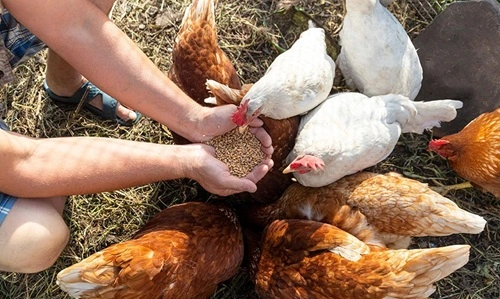Yes, in some circumstances, it is illegal or prohibited to feed chickens chicken or any other type of animal byproducts. Regulations vary depending on federal, state, and local laws, as well as guidelines provided by organizations like the USDA (United States Department of Agriculture). These laws are in place to protect public health, prevent the spread of diseases, and maintain ethical farming practices.
Why Feeding Chickens Chicken Can Be Illegal
1. Prevention of Disease
- Feeding chickens their own meat or other animal byproducts can promote the spread of diseases like avian influenza, salmonella, or mad cow disease (if ruminant protein is involved).
- The USDA and state agriculture departments enforce strict regulations to minimize these risks in both commercial and backyard farming.
2. Ethical Concerns
- Feeding chickens chicken or other animal products raises ethical concerns about promoting cannibalism, which goes against natural chicken behavior. Many farming and welfare organizations discourage such practices.
3. Federal Laws and Guidelines
- The Federal Meat Inspection Act and the Food Safety Modernization Act prohibit certain practices in animal feeding to ensure the safety of the human food supply.
- Feeding chickens their own species or animal protein that has not been processed is considered unsafe under these laws.
4. State and Local Regulations
- Some states explicitly prohibit feeding chickens chicken meat or other poultry byproducts in commercial farming to prevent disease outbreaks. Backyard chicken owners may also be subject to similar rules under local health ordinances.
Exceptions and Legal Considerations
1. Processed Animal Protein
- Some processed animal proteins, like certain meat meals or fish meals, are allowed in poultry feed as long as they meet FDA and USDA safety standards.
- These feeds are heavily regulated and often used in commercial poultry production.
2. Household Scraps
- Feeding chickens kitchen scraps, including leftover chicken, may not be explicitly illegal for backyard flocks in some areas. However, it is discouraged due to health risks and ethical considerations.
- State-specific rules often dictate whether animal products can be included in scraps given to chickens.
3. Commercial Poultry Farms
- In commercial settings, strict rules apply to what can and cannot be fed to chickens. Feeding them animal byproducts is generally prohibited, with significant penalties for violations.
Risks of Feeding Chickens Chicken
1. Health Risks
- Chickens fed their own meat are at risk of developing diseases or nutritional deficiencies.
- Cross-contamination of bacteria from raw or undercooked chicken can lead to outbreaks of diseases like salmonella.
2. Cannibalistic Behavior
Feeding chickens their own kind can encourage aggressive behavior, leading to injury or harm within the flock.
3. Impact on Human Food Safety
Improper feeding practices can compromise the safety of eggs or meat from the chickens, posing risks to consumers.
How to Feed Chickens Responsibly
1. Stick to Approved Feeds
Use commercially prepared chicken feed that meets all regulatory standards and provides a balanced diet.
2. Avoid Animal Products
Avoid feeding chickens any animal products, especially raw or cooked chicken, to prevent health risks and ethical concerns.
3. Consult Local Regulations
Check your state and local laws regarding backyard chicken farming and what types of food are permitted.
4. Provide a Natural Diet
Supplement chickens’ diets with grains, vegetables, and insects, which align with their natural foraging habits.
Related FAQs
Q1. Is it illegal to feed chickens meat?
Ans: It depends on your location. In some areas, feeding chickens any type of meat is prohibited due to health risks. Always check local regulations.
Q2. What happens if chickens eat chicken accidentally?
Ans: If a chicken eats a small amount of cooked chicken accidentally, it is unlikely to cause immediate harm. However, this practice should not be routine due to long-term health risks.
Q3. Can I feed chickens kitchen scraps?
Ans: Yes, in many places, feeding chickens household scraps is allowed, but avoid scraps containing meat, onions, or processed foods to ensure their health.
Q4. Are commercial poultry feeds safe?
Ans: Yes, commercial feeds are formulated to meet chickens’ nutritional needs and are regulated for safety. Stick to trusted brands for backyard flocks.
Q5. What are the penalties for feeding chickens chicken in prohibited areas?
Ans: Penalties vary but may include fines, confiscation of the flock, or legal action, particularly in commercial farming settings.
Conclusion
Feeding chickens chicken is generally discouraged and, in some cases, illegal, particularly in commercial farming. This practice poses health risks, raises ethical concerns, and violates regulations designed to protect public health and food safety. For backyard chicken owners and farmers alike, providing a balanced and natural diet is essential to maintaining the health of the flock and complying with applicable laws.

